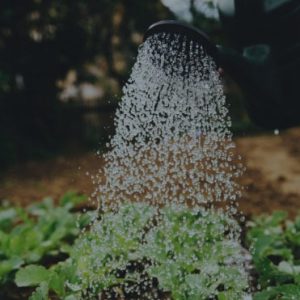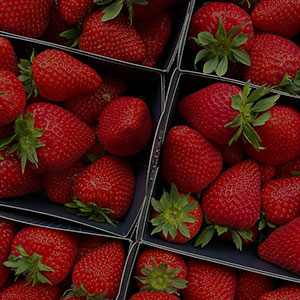OUR ENVIRONMENTAL PROTECTION STRATEGY
With ambitious climate and conservation goals, we are committed to sustainably fostering a healthier planet. And our commitment extends beyond the mere calculation, reduction, and offsetting of our greenhouse gas emissions; through various measures, we also promote the protection of nature, biodiversity, water, and soil quality.
OUR ECOLOGICAL FOCUS AREAS
GREENHOUSE GAS EMISSIONS
As an essential part of ecologically sustainable action, the reduction of our greenhouse gas emissions is particularly close to our hearts. Since the Paris Agreement on Climate Change in 2015, it has been perfectly clear that the progression of climate change can only be prevented if politics, economy, and society fundamentally rethink and reduce the output of greenhouse gas emissions. We contribute our part by committing ourselves to the 1.5°C target through ambitious goals and action plans at the corporate and product level.
BIODIVERSITY
Biodiversity not only plays an essential role for our company in the fruit and vegetable industry. It is also the basis for a healthy and therefore sustainable world. That’s why we are committed to the conservation of biodiversity and use various projects, both locally and along our supply chain, to achieve it.
Since 2018, we have actively supported bee protection through bee sponsorship programmes. In addition, our team has planted around 600 silver firs and beech trees in collaboration with the “Unternehmen Wald” foundation and participated in several litter collection campaigns in and around Hamburg in recent years . Furthermore, we initiate and support biodiversity measures in cultivation together with our producers.
REDUCTION OF FOOD LOSS
Approximately one-third of the food produced for human consumption is wasted worldwide. This has negative impacts on natural resources, biodiversity, and our climate.
As a member of the Sustainability Initiative Fruit and Vegetables (SIFAV), we have committed to reducing food losses and waste along the supply chains of our bananas and blueberries by 25 % by 2026 (compared to 2022). This equates to an annual reduction of approximately 6 %. In 2022, we successfully calculated the values for our banana and blueberry supply chains for the first time; in the future, we will publish an annual report with our reduction figures.
We continuously optimize the uses for non-saleable goods, too, with the objective of maximizing the meaningful utilization of supposed waste.
WATER MANAGEMENT
A sustainable approach to water resources is essential for the future of our planet and also for our business model. As a member of SIFAV, we have committed to implementing recognized standards for good water management for at least 70 % of the product quantities sourced from high water risk regions by 2026. We already achieved this goal in the first reporting year of 2022, with 77% of our product quantities meeting these standards.
In 2023, Port International also joined a project of the UK Waste and Resources Action Programme (WRAP), supported by SIFAV. The project is being carried out in the southern Spanish regions of Doñana and Murcia, where water scarcity is a particularly acute issue. You can find further information about our measures for WRAP here.
SUSTAINABLE PACKAGING
The ecological footprint of our products is clearly influenced by the packaging we use. To minimize negative impacts, we have already made various adjustments. One focus is on packaging avoidance. However, reducing the amount of packaging materials used is also crucial. For example, we have reduced the use of Banavac film, transitioned from flow packs to banderoles and stickers, and increased the use of top-seal films instead of solid plastic lids for trays.
Additionally, we have already tested the use of paper banderoles and top-seal films made from corn starch and are currently in the trial period for industrially compostable banana stickers.
ORGANIC FARMING
The protection of our agricultural land and the regeneration of soils are of essential importance for a functioning ecosystem and the preservation of biodiversity. That’s why the production of organic products is a matter close to our hearts. The organic share of our product quantities currently stands at 28 %, and for our bananas, it’s even at 64 % (as of 2022/23).
Additionally, we actively support our producers in implementing various regeneration measures such as the production of their own environmentally friendly fertilizers as well as various reforestation and soil conservation measure
REDUCTION MEASURES
BY OURSELVES AND OUR PARTNERS

Greenhouse Gas Emissions
Production renewable energy
• Geothermal energy (cucumbers in Hungary)
• Solar energy (diverse projects & countries)
• Wind energy (cucumbers in
Spain)
Renewable fuels
• Banana transportation (Ecuador & Netherlands)
• Citrus drying (Spain)(Spanien)
Electrification in cultivation
• Diverse measures (bananas in
Columbia & Dom. Rep.)
Sustainable cooling
• Bananas (Belgium)

Food loss
Biological post-treatment
• Bananas (Dom. Rep.)
Improving cold chains
• Bananas (Peru)
Community project
• Banana supply chain (NGO &
research)

WATER
Optimization of irrigation systems
• Bananas (Dom. Rep.)
• Diverse products (Spain)
Water recycling
• Diverse measures (bananas in
Dom. Rep. & Peru)
• Diverse measures (berries in
Spain)
Water protection project
• WRAP/WWF/Port International
(Spain)

Packaging
Recycled Plastic
• Trays & Transport Protection
(Various Products)
Substitution of Plastic
• Paper Wraps (Bananas
• Cardboard Corner Boards
(Bananas)
• Cellulose Nets (Citrus)
Reduced Material Usage
• Stickers (Bananas)
• Topseal (Berries)

Biodiversity
Production of Organic Fertilizer
• Bananas (Dominican Republic &
Peru)
• Watermelons (Italy)
Reforestation
• Berries (Spain)
• Bananas (Peru)
Avoidance of Herbicides
• Berries (Spain & France)
• Cucumbers (Spain)

Responsible Supply Chain
Living Wage project
• Bananas (Dom. Rep.)
Exclusive Partner
• Sustainable partnerships with
> 10 producers